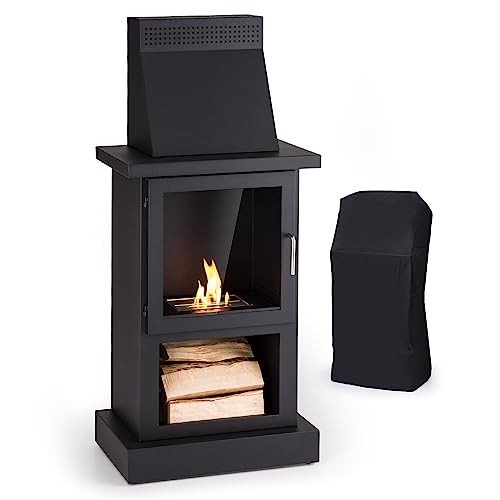A Comprehensive Guide to Small Fireplaces: Efficient Heating and Cozy Living
In an age where energy efficiency and area optimization are becoming progressively essential, small fireplaces have emerged as an enticing alternative to traditional, bulky hearths. These compact heating services offer warmth and a focal point for any room, increasing both comfort and visual appeal. This article explores the various types of small fireplaces, their advantages, setup factors to consider, and upkeep pointers, ultimately helping house owners make notified choices when considering these captivating heating options.
Comprehending Small Fireplaces
Small fireplaces use a range of styles, including electric, gas, ethanol, and wood-burning models. Each type provides distinct benefits and style possibilities, making them ideal for different living areas.
Types of Small Fireplaces
| Fireplace Type | Description | Pros | Cons |
|---|---|---|---|
| Electric | Utilizes electricity to create heat. Offers numerous styles, consisting of wall-mounted and freestanding systems. | - Easy to set up - Low maintenance - No venting required | - Limited heat output - May sustain higher electrical power costs |
| Gas | Burns natural gas or lp. Often available as logs in a traditional cheap fireplace uk or modern styles. | - Efficient heat output - Cleaner than wood - Easy ignition | - Requires gas line installation - Some systems require venting |
| Ethanol | Burns bioethanol, supplying real flames without a chimney. | - Eco-friendly - Portable - No installation required | - Limited heat output - Higher fuel costs |
| Wood-Burning | Traditional fireplaces that burn fire wood. Often used in more rustic settings. | - Great heat output - Rich ambiance - Can be utilized during power failures | - Requires a chimney - Regular maintenance and cleaning |
Benefits of Small Fireplaces
- Area Efficiency: Small fireplaces are perfect for apartment or condos, condominiums, and smaller sized homes. They optimize heat without taking up excessive flooring space.
- Cost-efficient Heating: In particular cases, small fireplaces can supplement central heater, minimizing overall energy costs while developing a more comfortable environment.
- Atmosphere and Aesthetics: They provide a welcoming focal point to a room, creating a cozy atmosphere ideal for relaxation and celebrations.
- Adaptability: Available in numerous designs and styles, small fireplaces can complement any design, from modern minimalist to rustic traditional.
Setup Considerations
When contemplating a small fireplace, installation is an essential aspect that can affect the choice of design. Below are useful considerations:
- Local Regulations: Building codes can differ by place; always inspect regional standards before installation.
- Ventilation Needs: Depending on the type, small fireplaces might need different ventilation systems. Gas fireplaces might need venting outdoors, while electric designs do not.
- Source of power: Electric models need distance to electrical outlets, while gas and ethanol models might require a gas line or fuel storage.
- Weight and Structure: Installing wall-mounted units may require strengthened wall locations, whereas free-standing designs are easier to transfer.
Upkeep Tips
Like any other home device, small fireplaces deals need regular maintenance to function efficiently and securely. Here are essential maintenance suggestions for numerous fireplace near me types:

For Electric Fireplaces:
- Cleaning: Wipe down the unit with a soft cloth to get rid of dust and keep the heating system ducts clear.
- Examination: Check the power cord frequently for any damages or signs of wear.
For Gas Fireplaces:
- Annual Inspections: Schedule annual inspections by an expert to ensure safe gas circulation.
- Clean the Logs: Regularly tidy the burner and logs to keep ideal performance.
For Ethanol Fireplaces:
- Fuel Storage: Store ethanol fuel securely away from direct sunshine and heat sources.
- Routine Cleaning: Clean the burner after each usage to keep performance and prevent soot buildup.
For Wood-Burning Fireplaces:
- Chimney Sweeping: Have the chimney professionally cleaned up once a year to avoid creosote buildup.
- Firewood Storage: Only usage dry, experienced wood to decrease smoke and promote effective burning.
Regularly Asked Questions
1. Can I set up a small fireplace myself?
While some electric and ethanol fireplaces are fairly easy to install, it is suggested to hire an expert for gas and wood-burning systems to ensure compliance with regional building regulations.
2. Just how much does it cost to run a small fireplace?
The expense will vary depending on the kind of best fireplace. Usually, electric fireplaces may sustain higher electricity costs, while wood-burning alternatives can draw from renewable fire wood supplies.
3. Do I require a license for setup?
Permits are generally required for gas and wood-burning luxury fireplaces due to their installation complexity and safety guidelines. Always check with local authorities.
4. How long can I run an electric fireplace?
A lot of electric fireplaces can run for long durations; however, it's suggested to follow manufacturer guidelines to prevent overheating or harming the system.
5. What type of small fireplace is best for a small area?
This mainly depends on private requirements. Electric models are versatile and simple to install, while gas and ethanol options supply genuine flames with effective heat output.
Small fireplaces represent a practical and stylish alternative for those looking for effective heating solutions in compact home. With various types offered, homeowners can choose models that align with their aesthetic choices and area requirements. By comprehending the setup processes and routine upkeep needed, individuals can enjoy the convenience and ambiance that small fireplaces provide for many years to come. Whether for a cozy night in your home or an inviting space for gatherings, small fireplaces are an enduring element of modern and traditional design alike.

